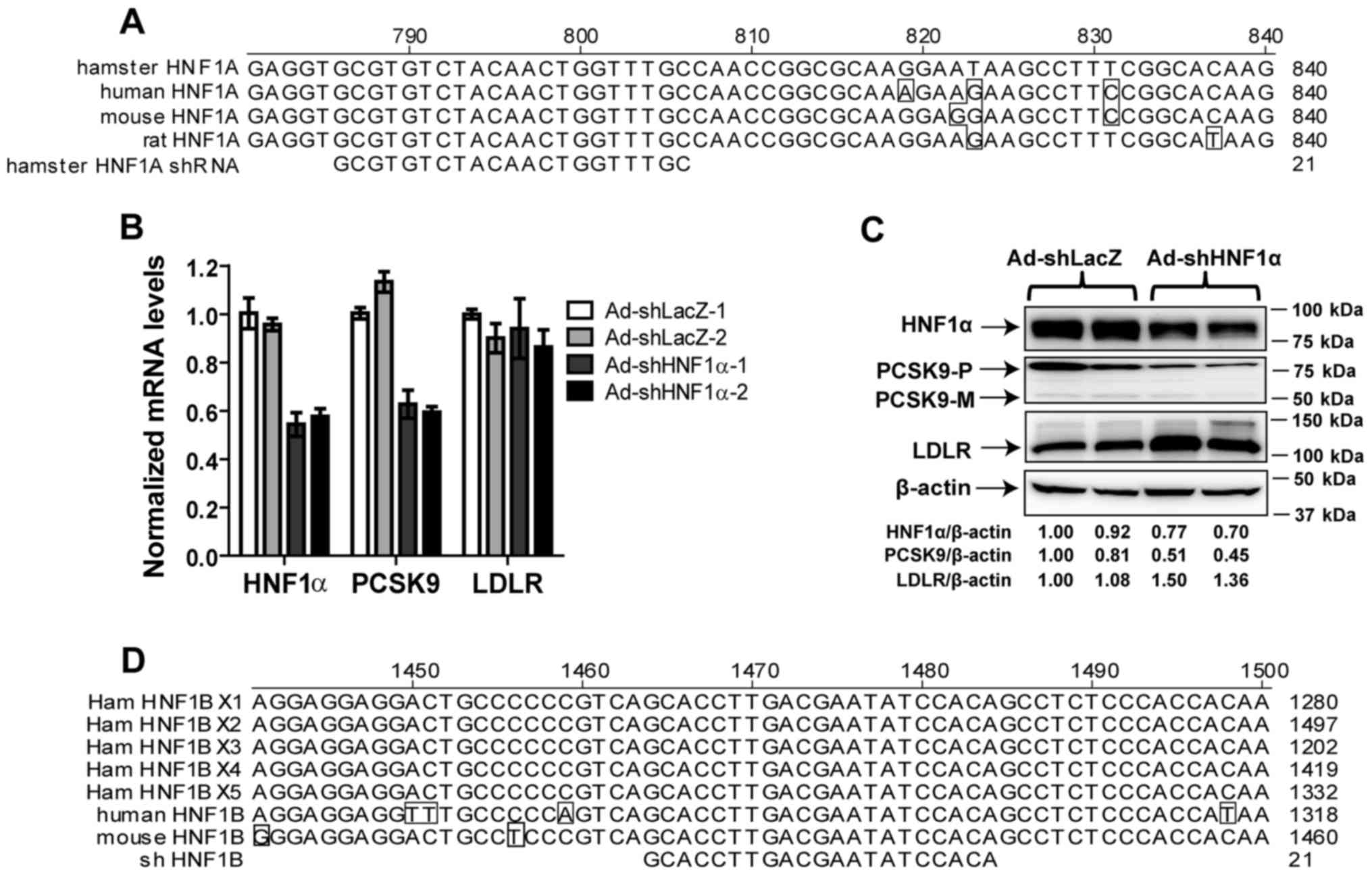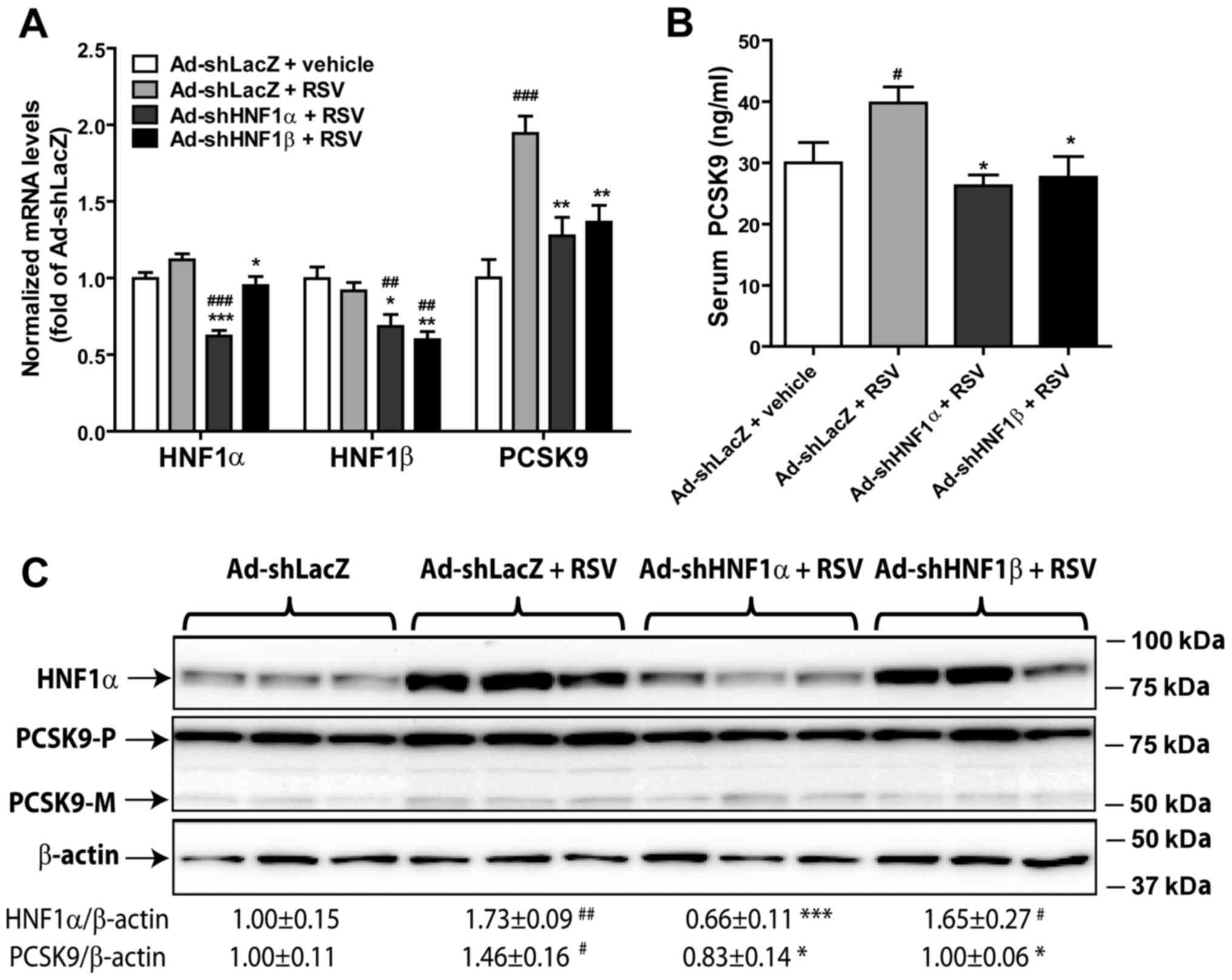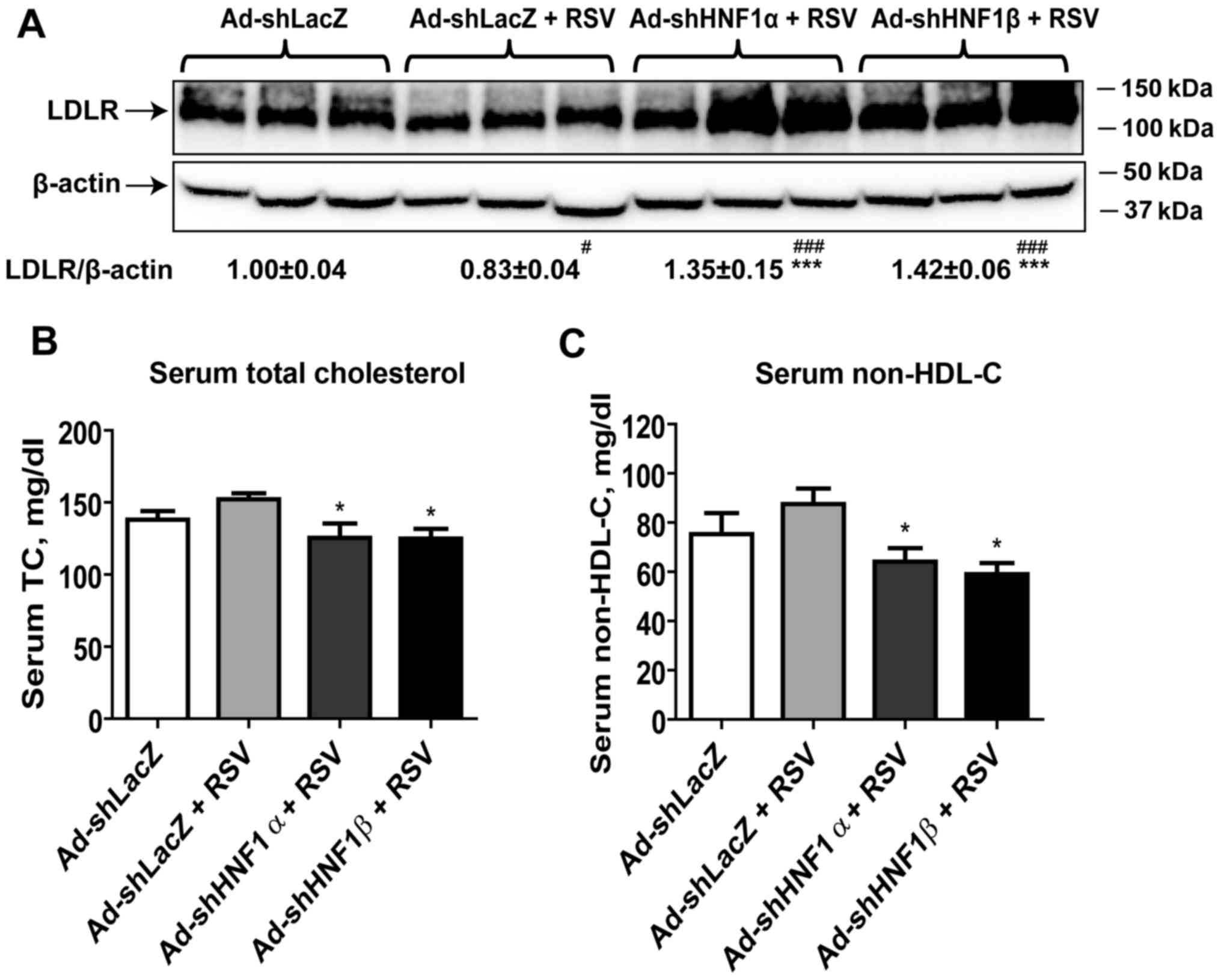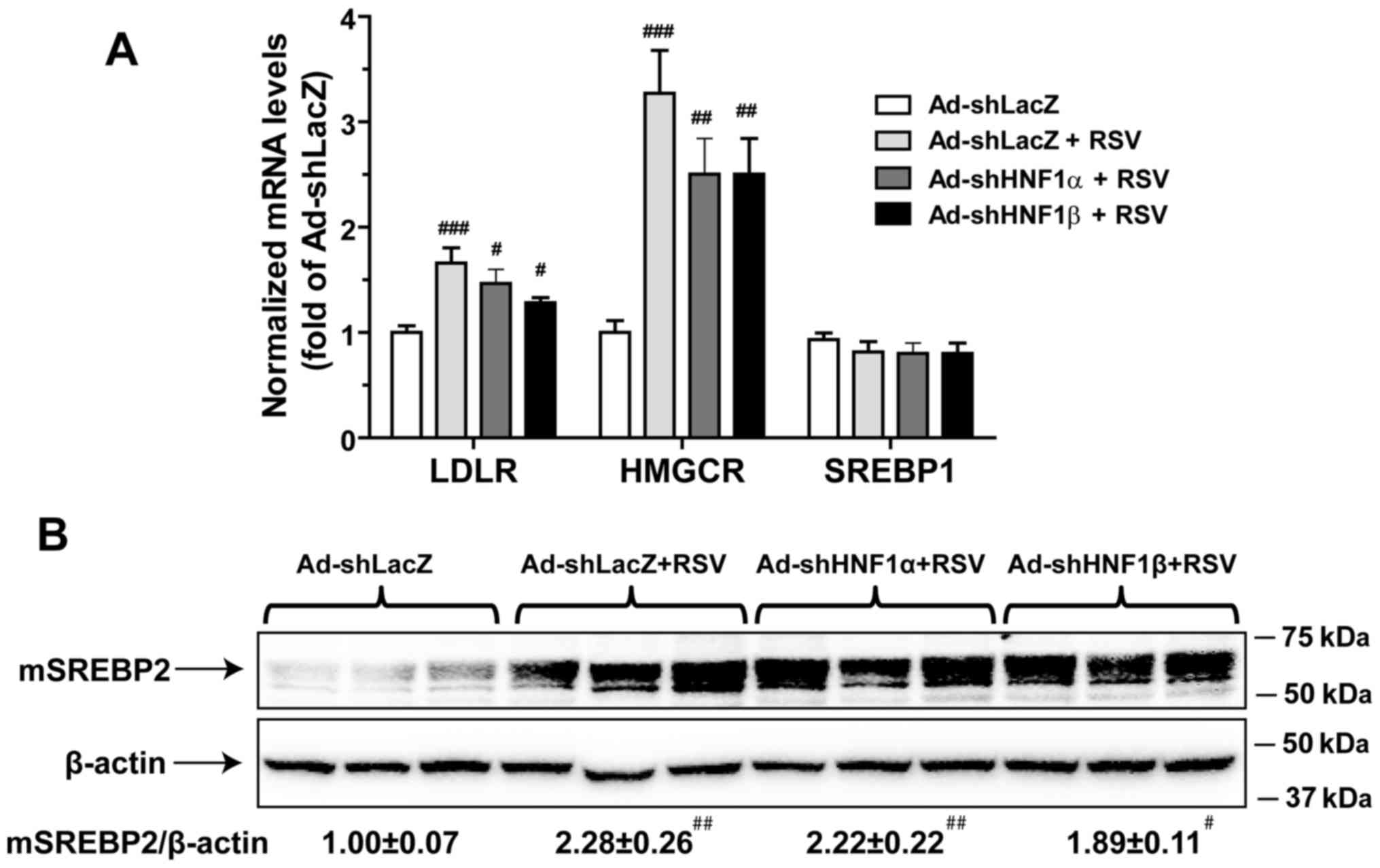|
1
|
Zhang DW, Lagace TA, Garuti R, Zhao Z,
McDonald M, Horton JD, Cohen JC and Hobbs HH: Binding of proprotein
convertase subtilisin/kexin type 9 to epidermal growth factor-like
repeat A of low density lipoprotein receptor decreases receptor
recycling and increases degradation. J Biol Chem. 282:18602–18612.
2007. View Article : Google Scholar : PubMed/NCBI
|
|
2
|
Lagace TA, Curtis DE, Garuti R, McNutt MC,
Park SW, Prather HB, Anderson NN, Ho YK, Hammer RE and Horton JD:
Secreted PCSK9 decreases the number of LDL receptors in hepatocytes
and in livers of parabiotic mice. J Clin Invest. 116:2995–3005.
2006. View
Article : Google Scholar : PubMed/NCBI
|
|
3
|
Lambert G, Ancellin N, Charlton F, Comas
D, Pilot J, Keech A, Patel S, Sullivan DR, Cohn JS, Rye KA and
Barter PJ: Plasma PCSK9 concentrations correlate with LDL and total
cholesterol in diabetic patients and are decreased by fenofibrate
treatment. Clin Chem. 54:1038–1045. 2008. View Article : Google Scholar : PubMed/NCBI
|
|
4
|
Lakoski SG, Lagace TA, Cohen JC, Horton JD
and Hobbs HH: Genetic and metabolic determinants of plasma PCSK9
levels. J Clin Endocrinol Metab. 94:2537–2543. 2009. View Article : Google Scholar : PubMed/NCBI
|
|
5
|
Ling H, Burns TL and Hilleman DE: An
update on the clinical development of proprotein convertase
subtilisin kexin 9 inhibitors, novel therapeutic agents for
lowering low-density lipoprotein cholesterol. Cardiovasc Ther.
32:82–88. 2014. View Article : Google Scholar
|
|
6
|
Horton JD, Shah NA, Warrington JA,
Anderson NN, Park SW, Brown MS and Goldstein JL: Combined analysis
of oligonucleotide microarray data from transgenic and knockout
mice identifies direct SREBP target genes. Proc Natl Acad Sci USA.
100:12027–12032. 2003. View Article : Google Scholar : PubMed/NCBI
|
|
7
|
Maxwell KN, Soccio RE, Duncan EM, Sehayek
E and Breslow JL: Novel putative SREBP and LXR target genes
identified by microarray analysis in liver of cholesterol-fed mice.
J ipid Res. 44:2109–2119. 2003.
|
|
8
|
Li H, Dong B, Park SW, Lee HS, Chen W and
Liu J: Hepatocyte nuclear factor 1alpha plays a critical role in
PCSK9 gene transcription and regulation by the natural
hypocholesterolemic compound berberine. J Biol Chem.
284:28885–28895. 2009. View Article : Google Scholar : PubMed/NCBI
|
|
9
|
Dubuc G, Chamberland A, Wassef H, Davignon
J, Seidah NG, Bernier L and Prat A: Statins upregulate PCSK9, the
gene encoding the proprotein convertase neural apoptosis-regulated
convertase-1 implicated in familial hypercholesterolemia.
Arterioscler Thromb Vasc Biol. 24:1454–1459. 2004. View Article : Google Scholar : PubMed/NCBI
|
|
10
|
Jeong HJ, Lee HS, Kim KS, Kim YK, Yoon D
and Park SW: Sterol-dependent regulation of proprotein convertase
subtilisin/kexin type 9 expression by sterol-regulatory element
binding protein-2. J Lipid Res. 49:399–409. 2008. View Article : Google Scholar
|
|
11
|
Raal F, Panz V, Immelman A and Pilcher G:
Elevated PCSK9 levels in untreated patients with heterozygous or
homozygous familial hypercholesterolemia and the response to
high-dose statin therapy. J Am Heart Assoc. 2:e0000282013.
View Article : Google Scholar : PubMed/NCBI
|
|
12
|
Dong B, Wu M, Li H, Kraemer FB, Adeli K,
Seidah NG, Park SW and Liu J: Strong induction of PCSK9 gene
expression through HNF1alpha and SREBP2: Mechanism for the
resistance to LDL-cholesterol lowering effect of statins in
dyslipidemic hamsters. J Lipid Res. 51:1486–1495. 2010. View Article : Google Scholar : PubMed/NCBI
|
|
13
|
Costa RH, Kalinichenko VV, Holterman AX
and Wang X: Transcription factors in liver development,
differentiation, and regeneration. Hepatology. 38:1331–1347. 2003.
View Article : Google Scholar : PubMed/NCBI
|
|
14
|
Mendel DB, Hansen LP, Graves MK, Conley PB
and Crabtree R: HNF-1α and HNF-1β (vHNF-1) share dimerization and
homeo domains, but not activation domains, and form heterodimers in
vitro. Genes Dev. 5:1042–1056. 1991. View Article : Google Scholar : PubMed/NCBI
|
|
15
|
Ai D, Chen C, Han S, Ganda A, Murphy AJ,
Haeusler R, Thorp E, Accili D, Horton JD and Tall AR: Regulation of
hepatic LDL receptors by mTORC1 and PCSK9 in mice. J Clin Invest.
122:1262–1270. 2012. View
Article : Google Scholar : PubMed/NCBI
|
|
16
|
Servitja J-M, Pignatelli M, Maestro MA,
Cardalda C, Boj SF, Lozano J, Blanco E, Lafuente A, McCarthy MI,
Sumoy L, et al: Hnf1α (MODY3) controls tissue-specific
transcriptional programs and exerts opposed effects on cell growth
in pancreatic islets and liver. Mol Cell Biol. 29:2945–2959. 2009.
View Article : Google Scholar : PubMed/NCBI
|
|
17
|
Shende VR, Wu M, Singh AB, Dong B, Kan CF
and Liu J: Reduction of circulating PCSK9 and LDL-C levels by
liver-specific knockdown of HNF1α in normolipidemic mice. J Lipid
Res. 56:801–809. 2015. View Article : Google Scholar : PubMed/NCBI
|
|
18
|
Dong B, Singh AB, Azhar S, Seidah NG and
Liu J: High-fructose feeding promotes accelerated degradation of
hepatic LDL receptor and hypercholesterolemia in hamsters via
elevated circulating PCSK9 levels. Atherosclerosis. 239:364–374.
2015. View Article : Google Scholar : PubMed/NCBI
|
|
19
|
Miao J, Manthena PV, Haas ME, Ling AV,
Shin DJ, Graham MJ, Crooke RM, Liu J and Biddinger SB: Role of
insulin in the regulation of proprotein convertase subtilisin/kexin
type 9. Arterioscler Thromb Vasc Biol. 35:1589–1596. 2015.
View Article : Google Scholar : PubMed/NCBI
|
|
20
|
Hentze H, Jensen KK, Chia SM, Johns DG,
Shaw RJ, Davis HR Jr, Shih SJ and Wong KK: Inverse relationship
between LDL cholesterol and PCSK9 plasma levels in dyslipidemic
cynomolgus monkeys: Effects of LDL lowering by ezetimibe in the
absence of statins. Atherosclerosis. 231:84–90. 2013. View Article : Google Scholar : PubMed/NCBI
|
|
21
|
Dong B, Li H, Singh AB, Cao A and Liu J:
Inhibition of PCSK9 transcription by berberine involves
down-regulation of hepatic HNF1α protein expression through the
ubiquitin-proteasome degradation pathway. J Biol Chem.
290:4047–4058. 2015. View Article : Google Scholar
|
|
22
|
Cao A, Wu M, Li H and Liu J: Janus kinase
activation by cytokine oncostatin M decreases PCSK9 expression in
liver cells. J Lipid Res. 52:518–530. 2011. View Article : Google Scholar : PubMed/NCBI
|
|
23
|
Wu M, Dong B, Cao A, Li H and Liu J:
Delineation of molecular pathways that regulate hepatic PCSK9 and
LDL receptor expression during fasting in normolipidemic hamsters.
Atherosclerosis. 224:401–410. 2012. View Article : Google Scholar : PubMed/NCBI
|
|
24
|
Verbeek R, Stoekenbroek RM and Hovingh GK;
CSK9 inhibitors: Novel therapeutic agents for the treatment of
hypercholesterolemia. Eur J Pharmacol. 763:38–47. 2015. View Article : Google Scholar : PubMed/NCBI
|
|
25
|
Huynh K: Dyslipidaemia. Assessing the
efficacy and safety of evolocumab and alirocumab. Nat Rev Cardiol.
12:2612015. View Article : Google Scholar : PubMed/NCBI
|
|
26
|
Desai NR and Sabatine MS: PCSK9 inhibition
in patients with hypercholesterolemia. Trends Cardiovasc Med.
25:567–574. 2015. View Article : Google Scholar : PubMed/NCBI
|
|
27
|
Yin W, Carballo-Jane E, McLaren DG,
Mendoza VH, Gagen K, Geoghagen NS, McNamara LA, Gorski JN, Eiermann
GJ, Petrov A, et al: Plasma lipid profiling across species for the
identification of optimal animal models of human dyslipidemia. J
Lipid Res. 53:51–65. 2012. View Article : Google Scholar :
|
|
28
|
Dietschy JM, Turley SD and Spady DK: Role
of liver in the maintenance of cholesterol and low density
lipoprotein homeostasis in different animal species, including
humans. J Lipid Res. 34:1637–1659. 1993.PubMed/NCBI
|
|
29
|
Quig DW, Arbeeny CM and Zilversmit DB:
Effects of hyperlipidemias in hamsters on lipid transfer protein
activity and unidirectional cholesteryl ester transfer in plasma.
Biochim Biophys Acta. 1083:257–264. 1991. View Article : Google Scholar : PubMed/NCBI
|
|
30
|
Taghibiglou C, Carpentier A, Van Iderstine
SC, Chen B, Rudy D, Aiton A, Lewis GF and Adeli K: Mechanisms of
hepatic very low density lipoprotein overproduction in insulin
resistance. Evidence for enhanced lipoprotein assembly, reduced
intracellular ApoB degradation, and increased microsomal
triglyceride transfer protein in a fructose-fed hamster model. J
Biol Chem. 275:8416–8425. 2000. View Article : Google Scholar : PubMed/NCBI
|
|
31
|
Harries LW, Brown JE and Gloyn AL:
Species-specific differences in the expression of the HNF1A, HNF1B
and HNF4A genes. PLoS One. 4:e78552009. View Article : Google Scholar : PubMed/NCBI
|


















